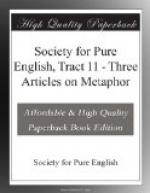First, it means for the most part the same as implied, and, as it is certainly not so instantly intelligible to the average man, it might have been expected to be so good as to die. That it has nevertheless survived by the side of implied is perhaps due to two causes: one is that explicit and implicit make a neater antithesis than even expressed and implied (we should write all the conditions, whether explicit or implicit; but all the implied conditions; implied being much commoner than implicit when the antithesis is not given in full); and the other is that the adverb, whether of implicit or of implied, is more often wanted than the adjective, and that impliedly is felt to be a bad form; implicitly, preferred to impliedly, helps to keep implicit alive.
Secondly, there is the historical accident by which implicit, with faith, obedience, confidence, and such words, has come to mean absolute or full, whereas it originally meant undeveloped or potential or in the germ. The starting-point of this usage is the ecclesiastical phrase implicit faith, i.e. a person’s acceptance of any article of belief not on its own merits, but as a part of, as ‘wrapped up in’, his general acceptance of the Church’s authority; the steps from this sense to unquestioning, and thence to complete or absolute or exact, are easy; but not every one who says that implicit obedience is the first duty of the soldier realizes that the obedience he is describing is not properly an exact one, but one that is involved in acceptance of the soldier’s status.—[H.W.F.]
It seems to us (by virtue of this ‘historical accident’) that in such a phrase as the implied or implicit conditions of a contract, there is a recognized difference of meaning in the two words. Implied conditions, though unexpressed, need not be hidden, they are rather such as any one who agreed to the main stipulation would recognize as involved; and the word implied might even carry the plea that they were unspecified because openly apparent. On the other hand implicit conditions are rather such as are unsuspected and in a manner hidden.—[ED.]
PRACTICALLY
A correspondent complains that the adverb ‘almost’ is being supplanted by ‘practically’. ’The true meaning of “practically” (he writes) is “in practice” as opposed to “in theory” or “in thought”; for instance, Questions which are theoretically interesting to thoughtful people and practically to every one, or again, He loves himself contemplatively by knowing as he is known and practically by loving as he is loved.’ And he finds fault with the O.E.D., whence he takes his quotations, for not condemning such phrases as these, The application was supported by practically all the creditors, and, He has been very ill but is now practically well again.




